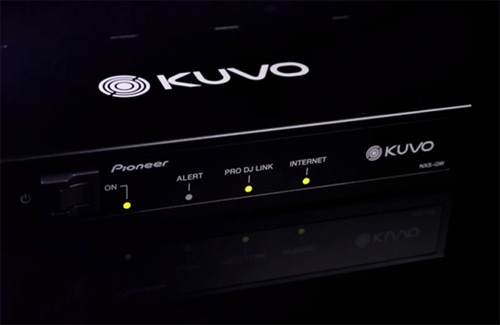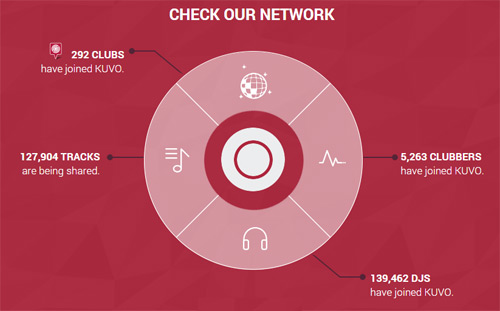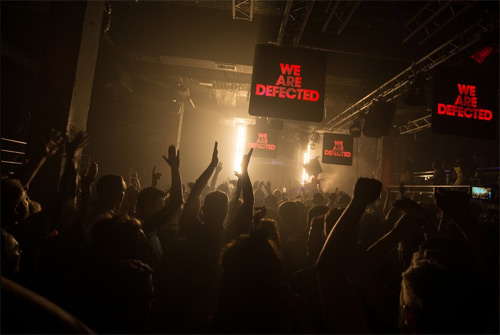Audio-equipment behemoth Pioneer this week unveiled its latest innovation for clubland, KUVO, an app and website that offers real-time information about what DJs are playing in clubs across the world. But despite its obvious appeal there has been backlash from some quarters about the instant gratification it offers. Here, Defected's Ben Lovett wades through the arguments...
At KUVO’s heart is a bold app ‘n’ web platform delivering real-time information on what DJs are playing to their adoring masses. And a little black box.... KUVO’s hardware connects to the CDJs and mixer (Pioneer only at this stage, though the manufacturer has confirmed it is in ‘advanced talks’ with other hardware and software properties) and, in turn, streams their musical playlist to a vast and dedicated sonic cloud. Participating venues then connect to KUVO’s network via Pro DJ Link LAN, allowing for live app updates on what any given DJ is playing.
The app, both iOS and Android compatible, can be used by anyone, but there are clear audiences in mind. The clubbing masses are one, now being handed an opportunity to create their own playlists based on the night so far, follow specific clubs and DJs, upload dancefloor photos and find other ‘plugged in’ venues. The likes of London’s Ministry Of Sound, Miami’s Mansion and Ibiza’s Space are already on board. Not to mention star ambassadors Richie Hawtin, Seth Troxler and James Zabiela.
There is much to admire about this latest technological advance. Many dance fans have long felt frustration upon hearing mind-blowing beats and then not being able to work out what they are, let alone buy them. Such ignorance has lasted weeks, months... lifetimes even. KUVO, however, provides instant knowledge and access, and in doing so undoubtedly bolsters dance music’s often volatile economy – one can imagine inspired clubbers heading home in the wee small hours and immediately downloading the tunes their app has helpfully catalogued. Indeed, the tracks KUVO lists will be made available for instant purchase on both iTunes and Juno.
Pioneer asserts that its new platform will better support the efforts of new artists and independent labels, and more comprehensively unify the global dance community – audiences and releases always on the same digital page. DJs themselves may also benefit from being able to quickly reference the selections of peers – opening their minds further and better informing the music they play or produce next time round. “This is the one that I think a lot of people have been waiting for” Zabiela suggests. “It’s just the universal appeal it has, as a label owner, as a DJ, as a clubber, as someone that is just into music.” Hawtin adds: “If we can allow people to know more about what DJs are playing, we can actually spread the message of electronic music...then, our whole scene can grow, creatively and financially...and we continue to be independent altogether.”

Concerns, however, have been voiced. If the masses can instantly now grasp the peaks and troughs of a typical Saturday night, will that mean heads in smartphones rather than hands in air? Many of the DJing cognoscenti have spoken out in recent months about the detrimental effect of social networking in the club. This time last year, in fact, Francois Kevorkian told Defected: “So often today people are using their phones and technology in the clubs and letting themselves be distracted. They take it for granted, there’s something else going on for them beyond the music...The music and the feelings that the music brings are the most important things.”
It’s a view strongly shared by Joe Public. Posting in response to KUVO’s launch, one Resident Advisor forum member vincoh comments: “That is just gonna make even more people be on their phones in clubs while a dj is trying to make them enjoy his music...I just don’t understand the point in going to a club to do everything but listening to the music being played and dance on it!!!” Fellow member mayaba adds: “Peoples [sic] needs to know everything, now! pfff that is bullshit... This is wrong, and this is not a party anymore,” before ‘oopu’ takes things further and concludes: “next step is the [redundancy] of having a live dj at all...”
The title of Spencer Parker’s recent Work Them EP, ‘The Moment Not The Memory’, seems particularly apt. Moreover, the record itself – Parker’s accompanying press blurb actually specifies that it is an EP ‘for those people on the dancefloor who embrace the moment, not the memory’. Here, again, is a sense that our dancefloors are changing; that in a world where everything is hyperlinked and brightly illuminated there is no chance for an underground scene to fully fly or, crucially, those amazing ‘in-club’ flashes of unknown, unexpected sonic epiphany.
KUVO ambassador Hawtin (who will also align his own data-gathering RADR platform with Pioneer) talks convincingly about bringing the music closer to the people by removing a DJ’s smoke and mirrors, but isn’t that mystery one of clubland’s magical attractions? Plenty of forum chatter concurs - so says iamabe: “...i can’t tell how many times I’ve enjoyed the shit out of a tune and begged to find it later. That mystery can be part of the fun....” Audiojack-er Rich Burkinshaw’s Defected interview echoes – quite literally – Parker’s sentiments: “Some people don’t go to parties just to dance to fresh music and have a good time anymore, they go to the ‘cool’ parties...and take videos on phones to show cool it was on Facebook. We prefer to live in the moment, rather than the memory.”
But KUVO might still represent the dance industry’s best chance of evolution where the long chaotic issue of nightclub performance royalties is concerned - if everyday (or ‘everynight’) clubbers are one key audience then the artists themselves are another. In launching KUVO Pioneer has teamed up with the newly-formed Association For Electronic Music, promising to share its banging meta-data and help facilitate the transfer of nightclub performance royalties into the hands of songwriters and producers. Pioneer will share its data for free.

Last week, at the Amsterdam Dance Event (ADE), AFEM unveiled a new campaign, Get Played Get Paid, which highlighted the electronic scene’s growing royalties black hole via weighty research suggesting dance artists could be missing out on up to £100m in payments per year. £100m is the estimated amount due to electronic artists and collected by relevant performance societies but then often delivered to the wrong people because of incomplete or missing data. In the UK alone, the combined sum collected for electronic music by major collection societies PPL and PRS For Music is thought to be around £15m and, again, much of it is believed to be hitting the wrong destinations.
“Part of the problem is down to writers, artists and tracks not being registered at collection societies so the organisations don’t know who to pay” AFEM CEO Mark Lawrence explains. “But even more significantly, most societies do not have accurate granular data on what is actually played in clubs.” Enter KUVO. Pioneer builds approximately 80% of the world’s DJ booths and, perhaps unsurprisingly, wrestled with the decision to give so much data away. “The immediate default position was ‘Data is money. Let’s monetize this’” Pioneer Europe’s Head Of Marketing Mark Grotefeld reflects. “But the performing rights societies aren’t our customers, the producers and clubs are. We’re bringing more money to producers and ultimately our business.”

Right now, Pioneer is talking to collection societies in Sweden, America (giants ASCAP and BMI) and the UK, with Australia already signed on. It is also testing its new technology in over 500 clubs around the world (on top of the 200 spaces KUVO is already in) and will look to keep providing its KUVO black boxes for free, so long as the program continues to turn profit. The program is progressing well. For many music-makers within the industry, there is the real promise now of compensation for their efforts and, beyond that, the promise of focusing full creative force on the studio where, previously, endless DJ sets have been necessary to bankroll artistic development. Looking well ahead, we may finally witness the separation of DJ and producer – both entirely different disciplines and able to exist independently of one another.
But first KUVO needs to negotiate the various hurdles outlined. It also needs to persuade those many, passionately self-reliant sub-sets of the dance scene to regiment their plans - artists joining collection societies, registering their music and sharpening business acumen; so often anathema to creativity. Elsewhere, nightclubs and dance venues will require special licenses. There is much still to do, in body and mind.
“This is an innovative and incredibly progressive move by Pioneer which will potentially benefit thousands of electronic music creators...” AFEM co-founder Ben Turner urges. “KUVO is creating an ecosystem of networked DJ booths that can share all their track info, creating a rich, interactive experience for clubbers, DJs and clubs” Grotefeld expands. That may be the case but at what cost exactly? How much will technological accessibility undermine the indescribable joy of dancefloor spontaneity? How much will one form of musical empowerment override another? What is clear is that we’re along for the ride whether we like it or not. Raving and repeating or kicking and screaming, we need to accept dance music’s latest seismic revolution and work it to our absolute best advantage. We need to seize the moment, whatever that moment might end up being....
Words: Ben Lovett
For more info on Pioneer DJ’s KUVO platform visit http://djclubnetwork.com/



